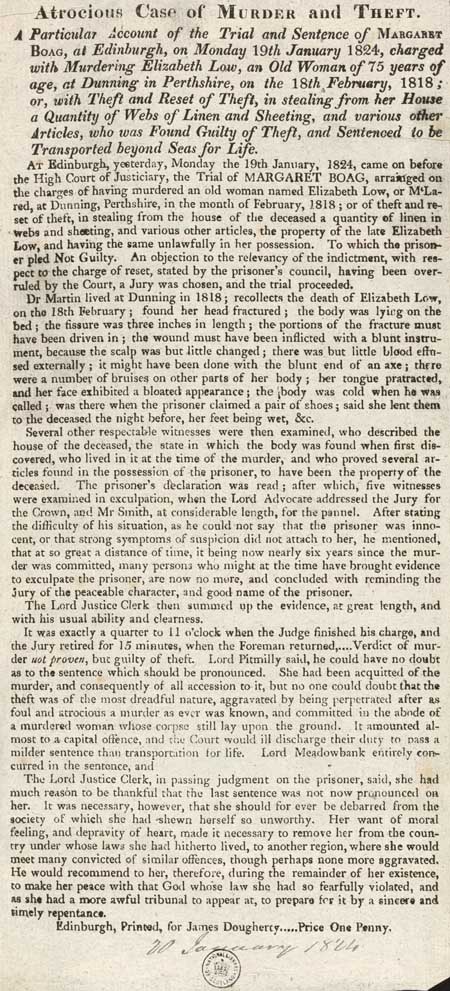Transcription
Atrocious Case of MURDER and THEFT. A Particular Account of the Trial and Sentence of MARGARET
BOAG, at Edinburgh, on Monday 19th January 1824, charged
with Murdering Elizabeth Low, an Old Woman of 75 years of
age, at Dunning in Perthshire, on the 18th February, 1818;
or, with Theft and Reset of Theft, in stealing from her House
a Quantity of Webs of Linen and Sheeting, and various other
Articles, who was Found Guilty of Theft, and Sentenced to be
Transported beyond Seas for Life. AT Edinburgh, yesterday, Monday the 19th January, 1824, came on before
the High Court of Justiciary, the Trial of MARGARET BOAG, arrainged on
the charges of having murdered an old woman named Elizabeth Low, or M'La-
red, at Dunning, Perthshire, in the month of February, 1818 ; or of theft and re-
set of theft, in stealing from the house of the deceased a quantity of linen in
Webs and sheeting, and various other articles, the property of the late Elizabeth
Low, and having the same unlawfully in her possession. To which the prison-
er pled Not Guilty. An objection to the relevancy of the indictment, with res-
pect to the charge of reset, stated by the prisoner's council, having been over-
ruled by the Court, a Jury was chosen, and the trial proceeded. Dr Martin lived at Dunning in 1818; recollects the death of Elizabeth Low,
on the 18th February ; found her head fractured ; the body was lying on the
bed ; the fissure was three inches in length ; the portions of the fracture must
have been driven in ; the wound must have been inflicted with a blunt instru-
ment, because the scalp was but little changed; there was but little blood effu-
sed externally ; it might have been done with the blunt end of an axe ; there
were a number of bruises on other parts of her body; her tongue pratracted,
and her face exhibited a bloated appearance ; the body was cold when he was
called ; was there when the prisoner claimed a pair of shoes; said she lent them
to the deceased the night before, her feet being wet, &c. Several other respectable witnesses were then examined, who described the
house of the deceased, the state in which the body was found when first dis-
covered, who lived in it at the time of the murder, and who proved several ar-
ticles found in the possession of the prisoner, to have been the property of the
deceased. The prisoner's declaration was read ; after which, five witnesses
were examined in exculpation, when the Lord Advocate addressed the Jury for
the Crown, and Mr Smith, at considerable length, for the pannel. After stating
the difficulty of his situation, as he could not say that the prisoner was inno-
cent, or that strong symptoms of suspicion did not attach to her, he mentioned,
that at so great a distance of time, it being now nearly six years since the mur-
der was committed, many persons who might at the time have brought evidence
to exculpate the prisoner, are now no more, and concluded with reminding the
jury of the peaceable character, and good name of the prisoner. The Lord Justice Clerk then summed up the evidence, at great length, and
with his usual ability and clearness. It was exactly a quarter to 11 o'clock when the Judge finished his charge, and
the Jury retired for 15 minutes, when the Foreman returned,....Verdict of mur-
der uot proven, but guilty of theft. Lord Pitmilly said, he could have no doubt
as to the sentence which should be pronounced. She had been acquitted of the
murder, and consequently of all accession to it, but no one could doubt that the
theft was of the most dreadful nature, aggravated by being perpetrated after as
foul and atrocious a murder as ever was known, and committed in the abode of
a murdered woman whose corpse still lay upon the ground. It amounted al-
most to a capital offence, and the Court would ill discharge their duty to pass a
milder sentence than transportation for life. Lord Meadowbank entirely con-
curred in the sentence, and The Lord Justice Clerk, in passing judgment on the prisoner, said, she had
much reason to be thankful that the last sentence was not now pronounced on
her. It was necessary, however, that she should for ever be debarred from the
society of which she had shewn herself so unworthy. Her want of moral
feeling, and depravity of heart, made it necessary to remove her from the coun-
try under whose laws she had hitherto lived, to another region, where she would
meet many convicted of similar offences, though perhaps none more aggravated.
He would recommend to her, therefore, during the remainder of her existence,
to make her peace with that God whose law she had so fearfully violated, and
as she had a more awful tribunal to appear at, to prepare for it by a sincere and
timely repentance. Edinburgh, Printed, for James Dougherty,....Price One Penny.
View Commentary | Download PDF Facsimile
|
 |
Date of publication:
1824 shelfmark: F.3.a.14(8)
 View larger image
View larger image
|


